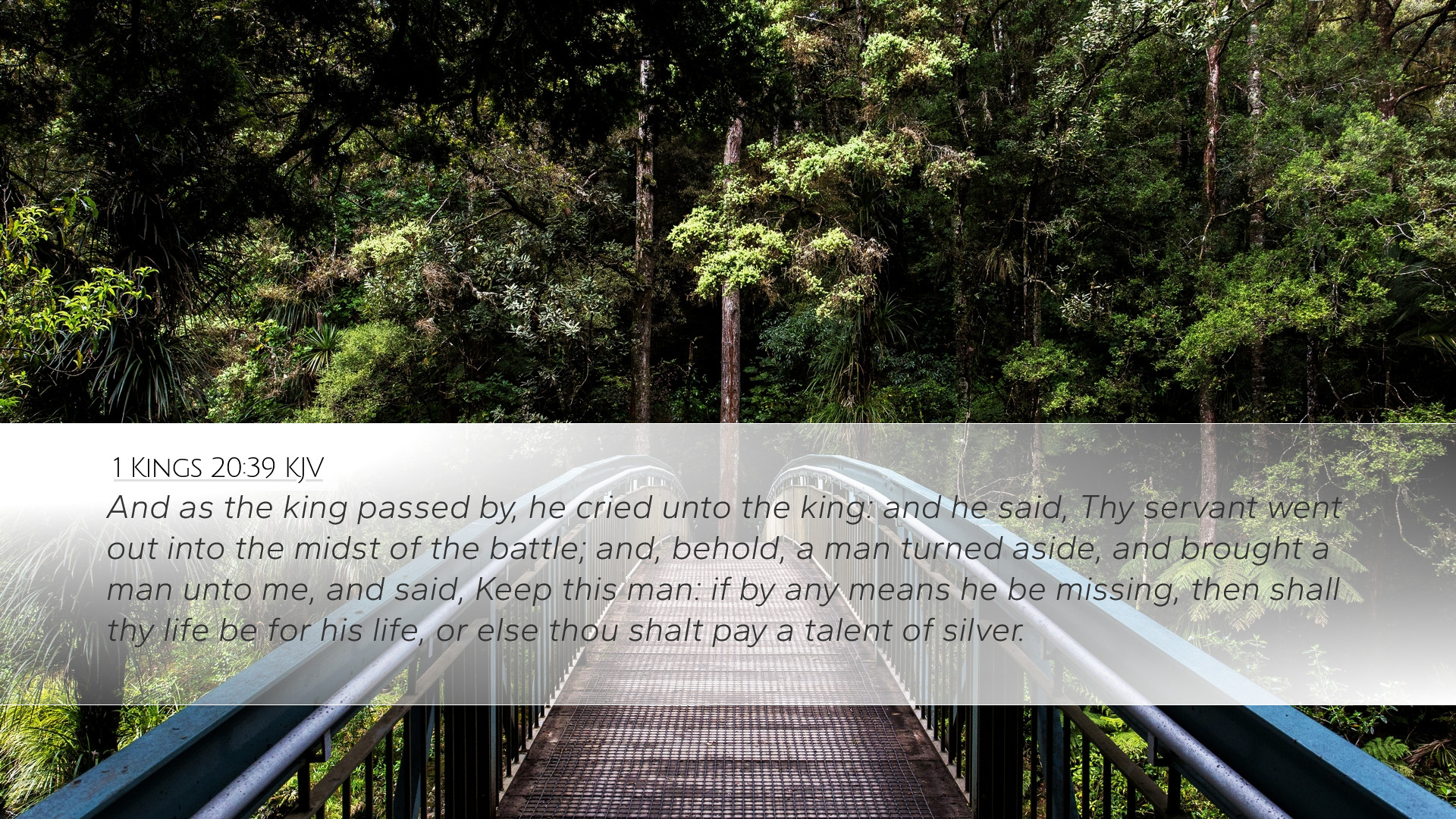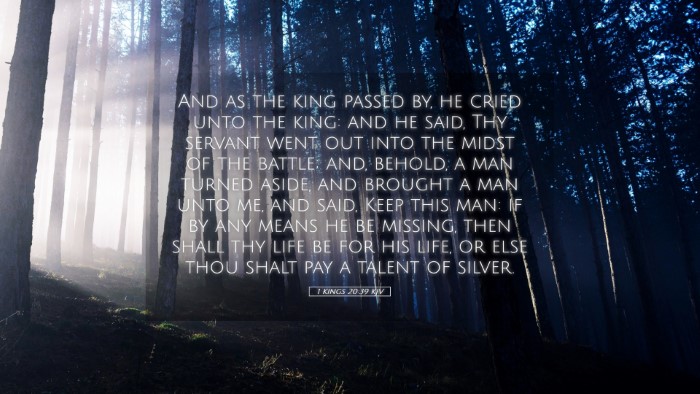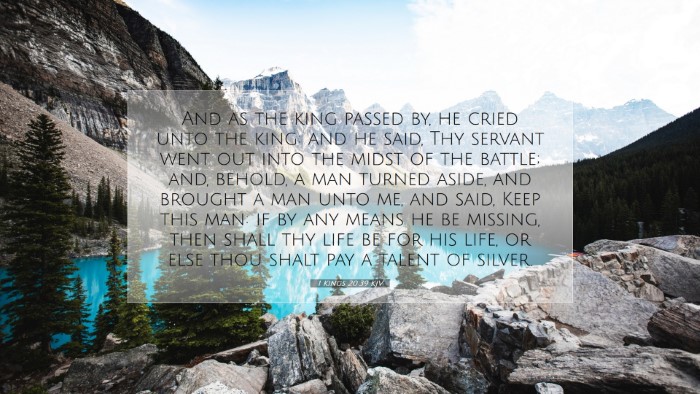Commentary on 1 Kings 20:39
Verse Overview: 1 Kings 20:39 narrates a pivotal moment during the altercation between Ben-hadad, king of Syria, and Ahab, king of Israel. The verse holds significant implications for understanding the themes of divine justice, mercy, and human responsibility in the actions of God's servants.
Contextual Background
The backdrop of this verse is the ongoing conflict between Israel and Syria. Ahab, depicted in the previous chapters as a king leading Israel into idolatry, faces the might of Ben-hadad, who seeks to assert dominance over Israel. This passage illustrates not only political struggles but also theological themes that are vital for understanding Israel's covenant relationship with God.
Verse Text:
And as the king passed by, he cried unto the king, and said, Thy servant went out into the midst of the battle; and, behold, a man turned aside, and brought a man unto me, and said, Keep this man: if by any means he be missing, then shall thy life be for his life, or else thou shalt pay a talent of silver. (1 Kings 20:39, KJV)
Commentary Insights
1. Matthew Henry's Perspective
Matthew Henry emphasizes the notion of divine judgment present in this verse. He interprets the act of the prophet disguising himself as a soldier to convey a truth about the responsibility that comes with power and authority. Henry draws parallels between the prophet's actions and Christ's parable of stewardship — where one must be accountable for the lives entrusted to them.
Key Takeaways from Henry:
- The Burden of Responsibility: The prophet illustrates that Ahab has a moral obligation not only to his people but also to God regarding the outcomes of war.
- Symbol of Justice: The command “keep this man” metaphorically points to the wider theme of divine justice and his responsibility to God’s covenant.
- Urgency of Adherence: The urgency in the prophet’s warning serves as a reminder that neglecting one’s duties can lead to severe consequences.
2. Albert Barnes' Commentary
Albert Barnes provides additional depth, noting the historical and cultural significance of the dialogue between Ahab and the disguised prophet. He highlights the human dynamics involved in the verse, as Ahab grapples with the tension between divine law and his own choices.
Key Themes from Barnes:
- The Human Element: Barnes stresses the importance of recognizing the humanity in Ahab’s decisions, bringing attention to his moral struggle.
- Contrast of Leadership: The commentary provides insight into the contrast between the righteous and the wicked leadership as depicted in the narrative.
- Divine Sovereignty: Barnes emphasizes that despite Ahab's leadership flaws, God's sovereign will is ultimately being fulfilled through the events.
3. Adam Clarke's Analysis
Adam Clarke focuses on the theological implications of this narrative, bringing to light the covenant relationship between God and Israel. He suggests that the message in the verse serves as a poignant reminder for Israel about the higher stakes of sin and obedience to God’s laws.
Clarke’s Insights:
- Covenantal Accountability: Clarke emphasizes that the king's actions reflect a deeper covenantal truth regarding obedience and its consequences for the nation of Israel.
- The Role of the Prophet: The prophet in disguise represents God's message to His people, indicating that divine warnings are often delivered through unexpected channels.
- Moral Integrity of Leadership: Clarke elaborates on the necessity of moral integrity in leadership, asserting that neglecting divine instructions brings about dire repercussions.
Theological Reflections
As we reflect on 1 Kings 20:39, it becomes evident that this passage offers rich theological insights that can inform modern readers, including pastors, students, and theologians. The interplay of divine command and human responsibility poses critical questions about leadership today.
Lessons for Contemporary Leadership:
- Accountability: Leaders are called to be stewards of their charges, holding themselves accountable as Ahab was reminded through the prophet.
- Response to Divine Direction: Just as Ahab was urged to heed divine warning, contemporary leaders must remain sensitive to God’s guidance.
- Impact of Choices: The verse underscores that choices made in positions of power have far-reaching consequences, urging leaders to consider their actions carefully.
Conclusion
In conclusion, 1 Kings 20:39 presents profound insights into the complexities of leadership, moral responsibility, and divine mercy. It challenges readers to examine their own roles in their respective contexts, emphasizing the importance of being vigilant stewards of the responsibilities entrusted to them. As reflected in the commentaries of Henry, Barnes, and Clarke, this verse serves as a timeless reminder that the interplay between divine expectations and human actions is pivotal for understanding scriptural narratives and their application for today's leaders.


